Career Overview
Program leaders and instructors in recreation, sport and fitness lead and instruct groups and individuals in related programs. People in this job work in community centres, health-care facilities, government departments and correctional institutions. They also work for sports and fitness clubs, resorts and tourism companies, and recreational facilities.
Job Titles
Duties
Program leaders and instructors in recreation, sport and fitness perform some or all these duties:
- Plan and carry out recreational, athletic, fitness and sports activities
- Manage, maintain and repair supplies and sports equipment
- Explain and coach others in athletic, fitness or sports activities and show them ways to improve these skills
- Teach groups and individuals in arts, crafts and similar activities and lead recreational or leisure programs
- Support clients with special needs
- Provide therapeutic recreational or athletic activities
- Monitor recreational, sports or fitness activities to make sure they are safe, and provide basic emergency or first aid assistance when needed
- Make sure that safety rules and regulations are followed
- Schedule activities and keep records
- Help to co-ordinate special events with the community, sponsors and others
- Hire, train, and supervise staff and volunteers
- Create budgets for equipment (including looking at how long each piece of gear will last)
- Monitor budgets for financial reporting and controlling of recreation programs and events
- Develop risk management plans for recreation programs and events
- Prepare reports
Earnings
Earnings is income that workers receive in exchange for their labour. Depending on the type of employment, earnings can be in the form of wages (hourly), salaries (fixed monthly or annual) or self-employed earnings.
Work Environment
# Workers Employed
13,315% Employed Full Time
19%People in this job work evenings and weekends on a regular basis. While some of the work takes place indoors in sports and recreational settings, some outdoor work may also be required. Some workers, such as lifeguards, work near or must enter water.
Program leaders and instructors in recreation, sports and fitness spend most of their day working with others and leading classes. Good communication skills are important in this role since program leaders and instructors speak with clients who take classes, play an organized sport or have questions about what is available to them. People in this job may be required to help with community events and to speak with groups or individuals who provide financial or other support for a community centre or other public recreational facility.
Career Pathways
People in this job can move into new positions as they gain experience in a range of service areas. This may include a focus on children or youth, seniors, or working in large organizations. Others stay in one service area and can move up in that area by taking on more responsibilities.
Typically, moving into a more senior role means that the person will need to oversee multiple service areas. For example, a recreation centre manager is responsible for all the service areas in the centre (skating, swimming, fitness and so on). While it’s not always necessary to have experience in each of these areas before becoming a manager, it’s useful and may help the person get promoted. In addition, it’s important to learn business skills to move into more senior roles. This can include budgeting, human resources and marketing.
Occupational Interests
It’s important to understand what kinds of occupations align with your interests.
For more about occupational interests visit Skills for the Future Workforce > Characteristics.
Here are the top occupational interest(s) for this career profile:
Education, Training and Skills
Completion of secondary school is usually required. Graduation from a college program in recreation or physical education or extensive experience in a specific recreational or sports program activity is typically needed.
Certification is usually required in a specific area of recreational, sports or fitness activity, such as ski instructor or personal trainer, or in first aid or emergency care. In addition, a demonstrated ability in a particular recreational, sport or fitness discipline is required.
Fitness appraiser certification may be required for fitness appraisers.
Program leaders and instructors in recreation, sport and fitness who are certified for that occupation by a regulator elsewhere in Canada can apply for the same certification from the regulator in B.C. Under the terms of the Canadian Free Trade Agreement (CFTA), most applicants who are transferring their credentials from elsewhere in Canada will not be required to complete additional training or testing. However, the B.C. regulator may ask applicants to provide further information such as a letter of good standing, references, or criminal record check.
For those who trained outside of Canada and never received certification from any Canadian jurisdiction, a full assessment is likely needed. Most occupational regulators have a process for assessment and recognize internationally trained applicants.
Contact the Lifesaving Society BC & Yukon Branch for details on how to apply for certification in B.C.
For information about labour mobility in Canada, visit www.workersmobility.ca.
View a list of Professional Regulatory Authorities in B.C.
Education programs in B.C.

Top Skills
Every job calls for a certain set of skills. Knowing those skills is the first step in finding a good career fit.
Here, you will find the 10 most relevant workplace skills. Some are more important to achieving success in a certain career than others. These skills may come naturally to you or you may need to gain them through education, training and experience.
See the list of work-related skills below, ranked in order of importance for this career. Check out the list and see if this career matches your skills—take that first step!
Actively looking for ways to help people.
Talking to others to share information effectively.
Keeping track of and assessing your performance, other individuals, or organizations to make improvements or take corrective action.
Being aware of others’ reactions and understanding why they react as they do.
Teaching others how to do something.
Giving full attention to what other people are saying, taking time to understand the points being made, asking questions as appropriate, and not interrupting at inappropriate times.
Adjusting actions in relation to others' actions.
Choosing and using training, instructional methods and procedures appropriate for the situation when learning or teaching new things.
Using logic and reasoning to identify the strengths and weaknesses of alternative solutions, conclusions or approaches to problems.
Considering the relative costs and benefits of potential actions to choose the most appropriate one.
Labour Market Statistics
Discover data, facts and information that have been gathered and analyzed. Learn about the characteristics of the economy and labour market in B.C.
Employment
Find out about employment types and trends by region and industry.
Employment
13,315Employment by Region







| Region | Employment | % Employment of this Occupation |
|---|---|---|
| Cariboo | 265 | 2.0% |
| Kootenay | 415 | 3.1% |
| Mainland/Southwest | 8,375 | 62.9% |
| North Coast and Nechako | 230 | 1.7% |
| Northeast | 140 | 1.1% |
| Thompson-Okanagan | 1,520 | 11.4% |
| Vancouver Island/Coast | 2,365 | 17.8% |
Labour Market Outlook
The B.C. Labour Market Outlook is a 10-year forecast of the expected supply and demand for labour in the province. It’s usually updated every year. The purpose is to provide British Columbians with the knowledge to make informed decisions on careers, skills training, education and hiring.
Forecasted Job Openings (2025-2035)
5,570Forecasted Job Openings
Forecasted Employment Growth Rate
Composition of Job Openings
Job Openings by Region (2025-2035)







| Region | Job Openings | Avg. Annual Employment Growth |
|---|---|---|
| Cariboo | 90 | 1.0% |
| Kootenay | 100 | 0.4% |
| Mainland/Southwest | 3,440 | 1.0% |
| North Coast and Nechako | 90 | 1.8% |
| Northeast | 30 | 0.2% |
| Thompson-Okanagan | 610 | 1.5% |
| Vancouver Island/Coast | 1,220 | 1.4% |
Industry Highlights
Learn about the opportunities in B.C.'s major industries, including employment trends, earning potential, locations of work and more.
Forecasted Job Openings by Industry
| Industry | Job Openings (2025-2035) |
|---|---|
| Information, Culture and Recreation | 3,590 |
| Educational Services | 770 |
| Health Care and Social Assistance | 620 |
| Repair, Personal and Non-Profit Services | 320 |
| Public Administration | 80 |
Insights from Industry
People in this career need to stay up to date in their speciality which could be focussed on seniors, children, general fitness or others. This means learning about new techniques and processes for fitness, sport, recreation as well as health, wellness and nutrition.
Having motivational and leadership skills makes a person with this career in higher demand. Communication, conflict resolution, problem solving and being able to support and mentor others are important skills.
A person in this career needs to have an understanding of current health and safety regulations and to make sure their team follows those.
Resources
-
British Columbia Recreation and Parks Association (BCRPA) – Job Listingswww.bcrpa.bc.ca/jobs
-
Recreation Facilities Association of British Columbia – Job Postingswww.rfabc.com/Classifieds.htm
-
Recreation Facilities Association of British Columbia (RFABC)www.rfabc.com








